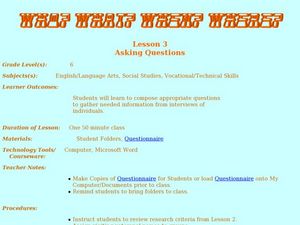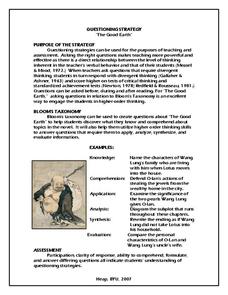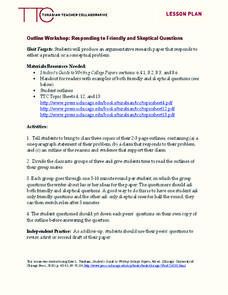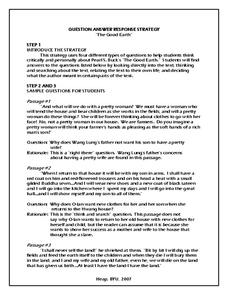Curated OER
Asking Questions
Review the basics of forming questions with this resource. ESL learners can practice forming questions, answering yes and no inquiries, and asking how long something takes. This resource provides a comprehensive exploration of the topic.
Curated OER
Who? What? When? Where? Asking Questions
Sixth graders interview Veterans or role play to answer who, what, where, when questions. In this Veteran's Day questioning activity, 6th graders learn about the events in the military service of veterans. Students may simulate...
Curated OER
Questioning
Practice making predictions by looking at the cover of a book. You can use The Hungry Thing, as suggested here, or any other book you may be reading in class. Use the predictions to talk about good reading strategies. A chart is...
Curated OER
Phineas Gage: Questioning Strategy
Focus on chapter two of Phineas Gage: A Gruesome but True Story About Brain Science with a questioning activity. After teaching and modeling several types of questions, learners work with partners and then independently to answer and...
Curated OER
The Wednesday Wars: Question Answer Response Strategy
Readers of The Wednesday Wars respond to model "Right There," "Think and Search," "On My Own," and "Author and You" (QAR) questions before crafting their own for class discussion.
Curated OER
The Old Man and the Sea: Questioning Strategies
Readers learn to ask questions about text with an activity based on Ernest Hemingway's The Old Man and the Sea. As they read, class members craft questions based on Bloom's Taxonomy and then find the answers themselves.
Curated OER
Speak: Questioning Strategy - ReQuest Strategy
The best way to analyze a piece of literature is to ask questions about the characters, plot, and theme. Encourage your learners to stump the teacher with the most difficult questions they can create using Bloom's Taxonomy and various...
Novelinks
The Good Earth: Questioning Strategy
Readers use Bloom's Taxonomy to create multi-level questions about Pearl Buck's The Good Earth.
E Reading Worksheets
Comprehension and Inference Question Creator
Encourage learners to ask questions about what they read with a activity about comprehension and inference questions. The resource provides directions and examples that guide kids through crafting their own questions.
Novelinks
Wildwood Dancing: Questions using Bloom’s Taxonomy of Thinking Process
Readers respond to a series of questions focused onJuliet Marillier's young adult novel Wildwood Dancing, and crafted to reflect the levels in Bloom's Taxonomy.
Curated OER
To Kill a Mockingbird: End of Novel Critical-Thinking Questions
Chapters 28 – 31 of Harper Lee’s To Kill a Mockingbird are the focus of a series of critical thinking questions. Responders are encouraged to refer directly to the novel to support their inferences and interpretations.
Curated OER
Asking the Questions and Questioning the Answers
What would you ask a presidential candidate if you had the chance? Bring politics to your language arts classroom with this lesson plan, in which young readers brainstorm questions they would have liked the presidential candidates to...
Curated OER
My Antonia: Bloom’s Taxonomy Questions
How well do your pupils know My Antonia by Willa Cather? Take some time to create questions about the text. After examining a teacher model, individuals write questions that match each level of Bloom's Taxonomy and draft answers to these...
Curated OER
The Adventures of Tom Sawyer: Study Help Essay Questions
Use these study questions to test your class on The Adventures of Tom Sawyer by Mark Twain. These mostly higher-level questions have the potential to be test questions, discussion questions, homework questions, or essay questions. The...
Novelinks
Roll of Thunder, Hear My Cry: Question Answer Response Strategy
Readers of Mildred D. Taylor's Roll of Thunder, Hear My Cry are introduced to the Question Answer Response Strategy (QAR) as a way to increase their engagement in and comprehension of the novel.
Turabian Teacher Collaborative
Outline Workshop: Responding to Friendly and Skeptical Questions
Answering questions is the best way to hone and revise your argument. Foster receptive writers with a workshop activity that promotes peer editing and argumentative writing skills. Given lists of both friendly and skeptical...
Novelinks
The Good Earth: Question Answer Response Strategy
Readers of Pearl Buck's The Good Earth craft and answer "Right There," "Think and Search," "On Your Own," and "Author and You" questions.
Palomar College
Making Yes/No Questions in the Present Tense
Does your class need some practice with writing yes or no questions in the present tense? This worksheet offers learners some choice as they pair activities with subjects to form questions. Pupils also write a quick response to each...
Novelinks
The Hobbit: Question Answer Relationship
Chapter 12 of The Hobbit provides the text for an exercise that asks readers to use the QAR strategy to develop and respond to questions about story.
Curated OER
Create College-Ready Readers with Text-Dependent Questions
Build content literacy and cater to the Common Core State Standards by creating text-dependent questions to accompany reading passages.
PB Works
George Washington’s Socks: Short-Answer Questions Chapters 1-9
Build a literature unit around the book George Washington's Socks with this series of short answer questions. Broken up in two- and three-chapter increments, these reading comprehension questions allow young readers to demonstrate...
Curated OER
Answering Literal Comprehension Questions
Practice using the Turn the Question Around (TQA) method to answer reading comprehension questions based on short narrative paragraphs. Instructions and materials are included for direct, guided, and independent instruction. Responses...
Curated OER
Questions
Explore end punctuation with this multi-step instructional activity on question marks. Scholars begin by finishing 10 sentences with either a period or a question mark. Consider discussing patterns they see at this point (first word,...
Curated OER
Question Marks
Context clues are important when understanding the intent of a sentence. Kindergartners read eight sentences, and decide if each should end in a period or in a question mark. The last two questions prompt kids to draw a mouse and a cat,...
Other popular searches
- Short Stories With Questions
- Open Response Questions
- Open Ended Questions
- Asking Questions
- Comprehension Questions
- Reporter Interview Questions
- Apollo 13 Questions Movie
- Bill Nye Video Questions
- Short Answer Questions
- Brainstorming Questions
- Wh' Questions
- Interview Questions























